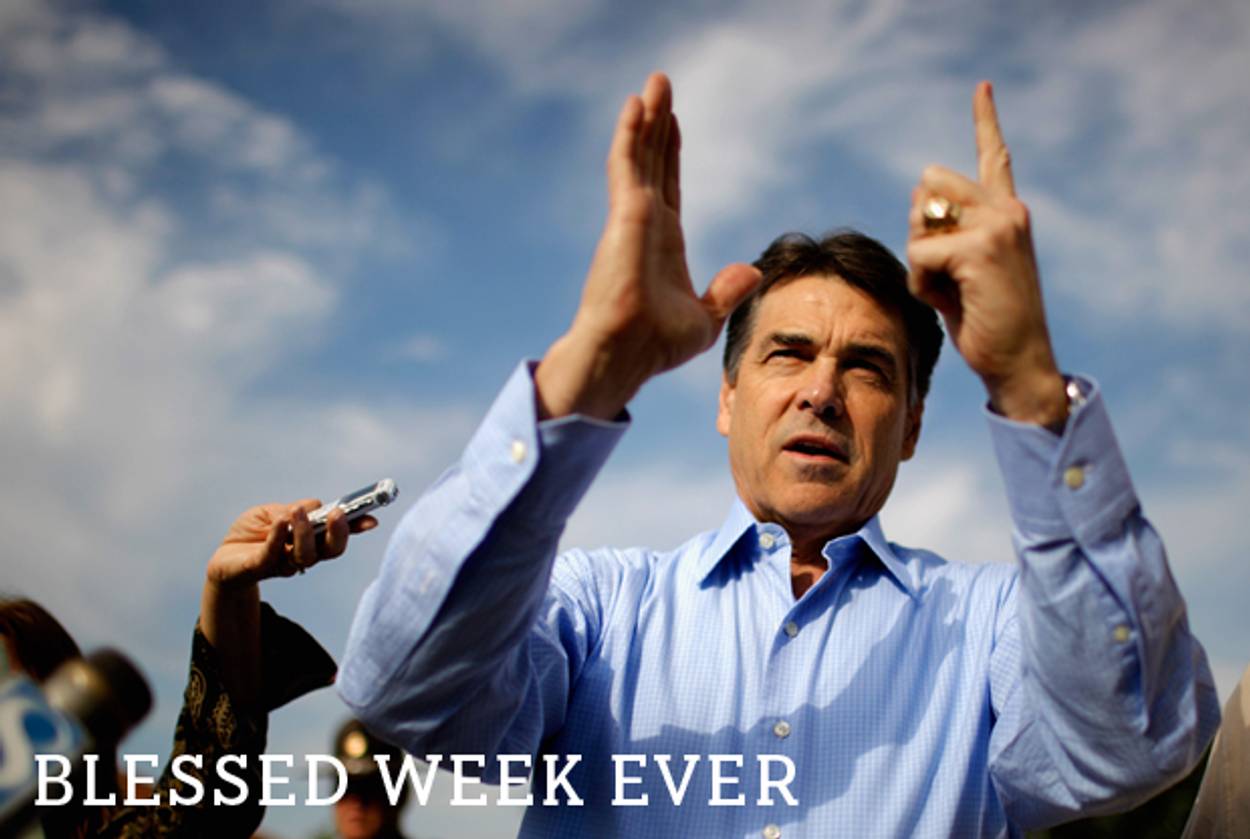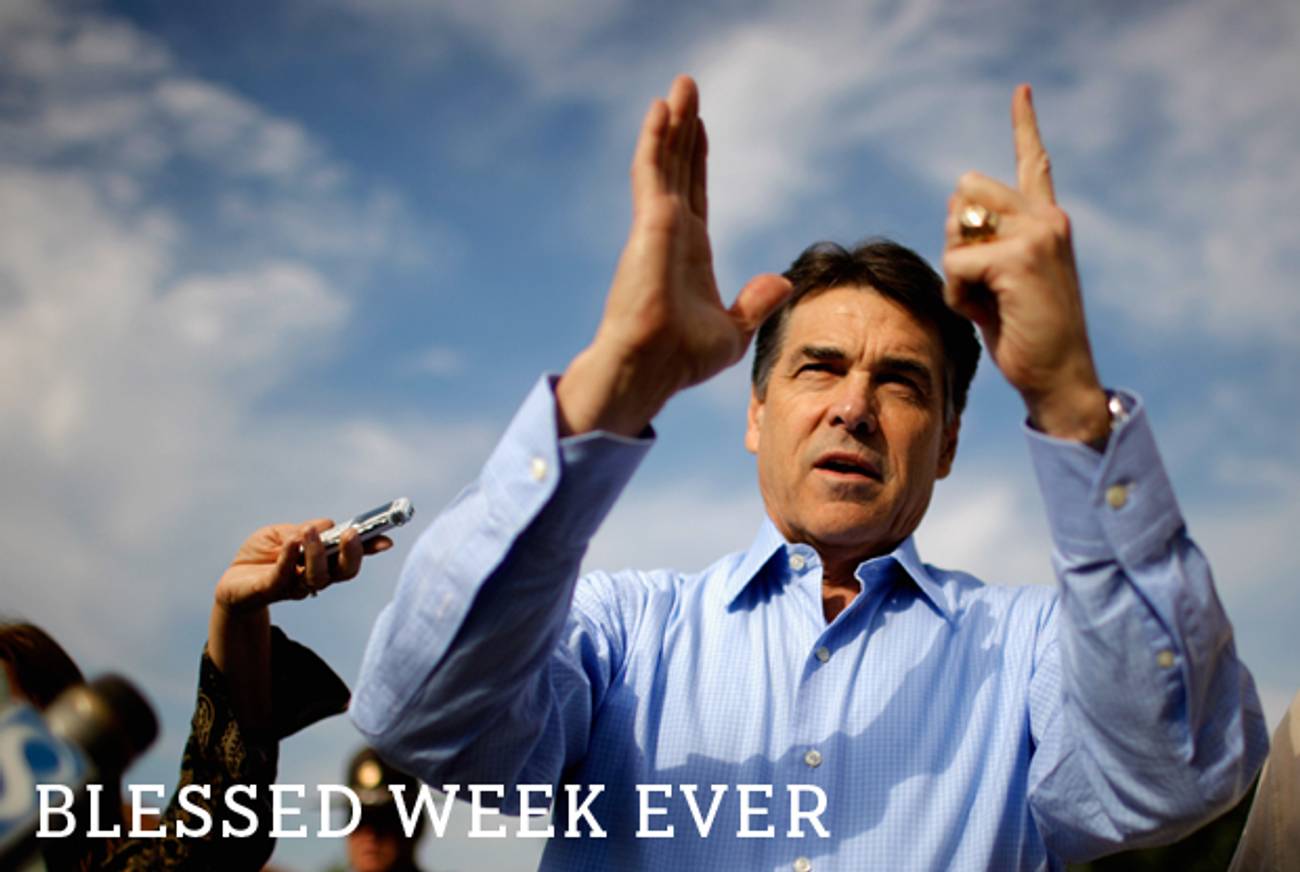Bad Faith
The Republican presidential candidates’ refusal to believe in things like global warming isn’t just bad science; it’s also very poor religion




The most entertaining reality television show in America follows a bunch of tanned, temperamental buffoons, each trying to outdo the other with preposterous catch phrases and flowery shows of ignorance. With apologies to the upstanding men and women of MTV’s Jersey Shore, I’m talking about the Republican candidates for president.
Taking the stage frequently in a recent series of televised debates, the contenders clawed at each other and growled at President Barack Obama. An ambitious group, they also took the time to contest reality. Take, for example, Rick Perry. “The fact is,” the Texas governor said when asked about global warming, “to put America’s economic future in jeopardy, asking us to cut back in areas that would have monstrous economic impact on this country, is not good economics and I will suggest to you is not necessarily good science. Find out what the science truly is before you start putting the American economy in jeopardy.”
And what might the science truly be? Perry claims to have found out. In an August town hall meeting in New Hampshire, he sang his gospel. “There are a substantial number of scientists who have manipulated data so that they will have dollars rolling in to their projects,” he said, “and I think we’re seeing weekly or even daily scientists who are coming forward and questioning the original idea that man-made global warming is what is causing the climate to change.”
Just where these intrepid scientists air their grievances daily, Perry didn’t say. It certainly isn’t in any credible academic publication: According to a study published last year in the Proceedings of the National Academy of Sciences, between 97 and 98 percent of the world’s 1,372 scientists “most actively publishing in the field” of climate research are quite certain of the idea of anthropogenic climate change, or climate change brought about by human actions.
But don’t expect the candidate who doesn’t lose sleep over the possibility of executing the innocent to lose heart when faced with the facts. And don’t expect his fan base to let science get in the way of a good story, either: As a survey released last week by the Yale Project on Climate Change shows, supporters of the Tea Party aren’t too troubled by global warming because a majority of them, 53 percent, believe it isn’t happening at all.
None of this, of course, is new. Radical ignorance has been in vogue with Republicans at least since a George W. Bush aide mocked his political foes for belonging to the benighted “reality-based community” while Bush and his followers answered to a higher power. “We are not this story’s author, who fills time and eternity with his purpose,” Bush said in his first inaugural address, referring to God. “This story goes on. And an angel still rides in the whirlwind and directs this storm.”
And herein, precisely, lies the problem. The Republican insistence on rejecting this reality for another, intangible one isn’t just bad science; it is, quite literally, bad faith.
Moses knew all about it. In this week’s parasha, he delivers yet another fiery speech to the Israelites, who are now standing on the doorstep of the Promised Land. But Moses isn’t interested in the immediate future; he’s more concerned with the recent past. “You have seen all that the Lord did before your very eyes in the land of Egypt, to Pharaoh, to all his servants, and to all his land,” he says, “the great trials which your very eyes beheld and those great signs and wonders. Yet until this day, the Lord has not given you a heart to know, eyes to see and ears to hear.”
It’s an odd epistemological argument: Even though you’ve seen God’s miracles with your own eyes, Moses tells the people, it is only now that you’re capable of true knowledge. And forget about the yiddisher kop; true knowledge comes not from the head but from the heart.
At first glance, Moses’ speech reads a bit like Stephen Colbert’s introduction of his famous term, truthiness. “I don’t trust books,” Colbert said in one of his show’s more memorable segments. “They’re all fact, no heart.” But Moses is smarter than that, and he knows that facts and heart work best when they work together. It’s not hard to guess how the Israelite leader came by his views. We can only imagine what went through his head when he descended from the mountain only to witness the golden calf; here, after all, were people who, just a few weeks before, had witnessed with their own eyes the glories of God, but, impatient with their absent leader, waited barely a month before fashioning a more tangible deity out of precious metals. In Sinai, the Israelites knew God with their minds, but not with their hearts. They realized that the Almighty was real and present, but they did not yet believe in him.
We mustn’t blame them. God is a mighty difficult idea to grasp. Proof of his existence doesn’t make it any easier. Faith is required. Because faith, Moses knows, is more than believing in things we’ll never know for certain exist; faith is also the wisdom to believe in things we know for certain do.
Which brings us back to the Republicans. The adherence of so many in the party to counterfactual narratives is often explained away by faith. Just what kind of faith Rick Perry repeatedly makes clear. In a speech in Virginia earlier this week, he said that his “faith journey is not the story of someone who turned to God because I wanted to. It was because I had nowhere else to turn. I was lost spiritually and emotionally.”
Perry, then, assumes that if he trusts in God, God will tell him what to do. He believes, if we take him at his word, that he is capable of interpreting the precise and unerring will of the Creator. This is the opposite of Moses’ brand of faith. For Perry, faith comes first, and proof is unnecessary; for Moses, proof comes first, and faith must follow. Perry was lost until he found God; Moses found God first and then made his people wander in the desert for 40 years, until they were ready—intellectually as well as emotionally—to embrace what faith meant.
And what faith really means is responsibility. Because we are incapable of knowing God’s mind—and by “we” I mean decent people of all political persuasions who are humbled by their belief in God—we’re left grappling with life’s greatest mysteries by ourselves. We try, like children playing a game with rules they don’t entirely understand, to make sense of what might seem, to the unbelieving, like a cruel and random existence. All we can do is our best, and our only guide is our heart and its call for compassion.
The Israelites at Sinai didn’t understand this idea at first. They yearned for a god they could grasp, a shiny golden god, a god they believed could redeem them. It took them four decades in the wilderness to learn that only they could redeem themselves, and that faith isn’t, in itself, salvation, but merely its engine. The Republicans are now learning the same lesson. Let us hope that they, too, are headed to the wilderness, where they can wander and wonder about the true nature of faith and the dictates of personal responsibility. If they don’t, if they allow the Tea Partiers in their midst to prevail, we are all looking at decades of false idols and bad faith.
Liel Leibovitz is a senior writer for Tablet Magazine and a host of the Unorthodox podcast.
Liel Leibovitz is editor-at-large for Tablet Magazine and a host of its weekly culture podcast Unorthodox and daily Talmud podcast Take One. He is the editor of Zionism: The Tablet Guide.